An oral history of Carol Kalish: the most important comic book figure you've never heard of
One of the most influential people ever to walk the halls of Marvel Comics
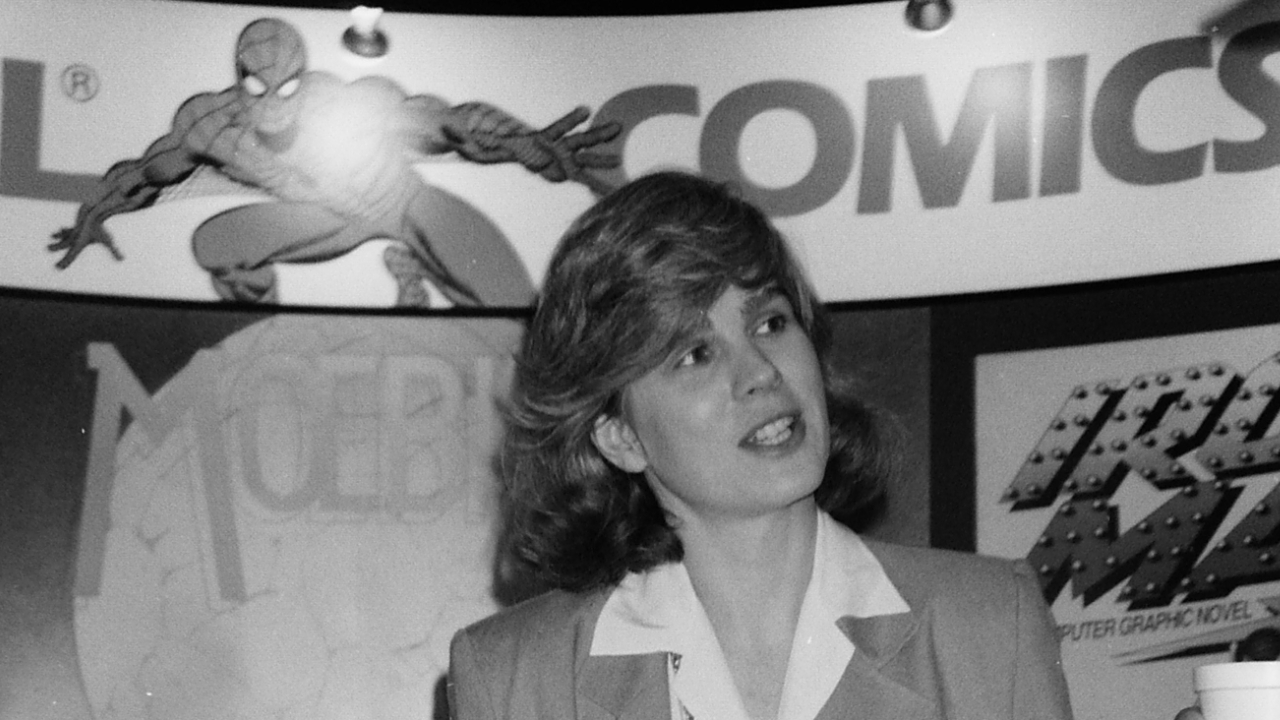
She was one of the most important people in the history of Marvel Comics. She was a vibrant personality who you could call at home, and who toured the country sleeping on retailers' couches to build a market for comics. She was the peacemaker and negotiator for an entire industry. She had the perfect solution to seemingly every problem.
So why have you never heard of Carol Kalish?
A lot of the answer is time and tide — time that has passed, and tide that has only seemingly washed away her many accomplishments.
Carol Kalish started working at Marvel on March 1, 1982, at the age of 27, in the then-fledgling direct sales department. She died suddenly on September 5, 1991 at age 36, having risen to the level of vice president-new product development. Both triumph and tragedy are wrapped up in that moment on September 5: Kalish was one of the main architects of a burgeoning comic book Direct Market, able to see its glory. But she was also cut down in the flower of youth, with so much work left undone.
There is both amazing human achievement and heartbreaking human tragedy in the most important person in comics you may have never heard of.
Who was Carol Kalish?
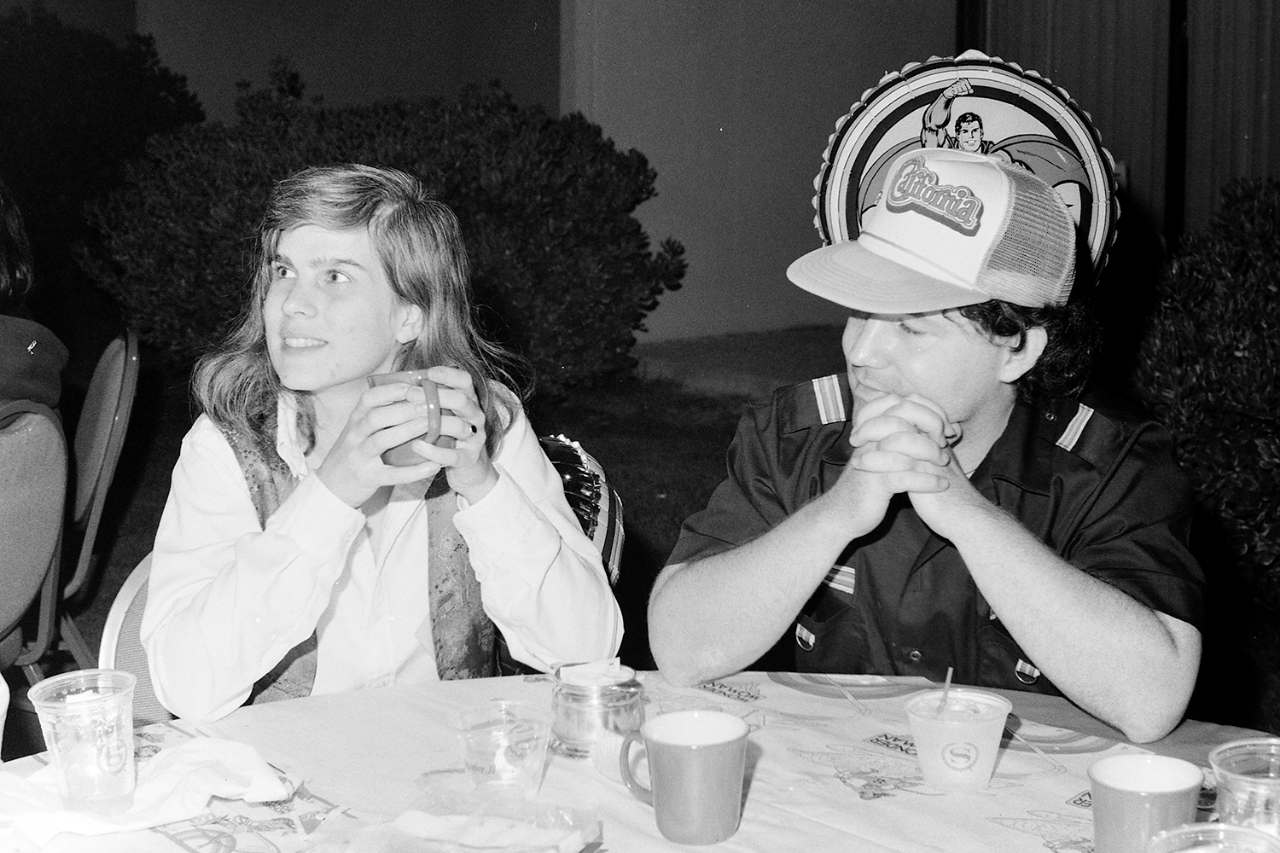
Richard Howell, artist and Carol's longtime domestic partner: "I think Carol was probably the second-best marketer in the history of the business, behind only Stan Lee. Carol's greatest strength in being in charge of the then-nascent direct sales department was in building up and stabilizing the retailers."
Paul Levitz, former DC Comics publisher: "The easiest way to put it was that she was the first strong bridge between the big publishers and the retailers in the emerging years of the comic shop. She was the first ambassador. She was the one out there, traveling and often sleeping on the couches of retailers as she was trying to modernize the system. She was the one who figured out how to get cash registers into the shops. It seems ridiculous, looking back from the perspective we have now, but it was a big step forward at the time. But the most important part was just being there. Those first-generation comic shops were very small business. It was hard for them to even imagine a connection to the publishers in New York. But here was Carol. She was the bridge."
Get the best comic news, insights, opinions, analysis and more!
Steve Geppi, president of Diamond Comic Distributors: "Carol was the champion of the Direct Market. That's the best thing you can say to make it concise. She really believed that this market had legs. She was also a mediator of sorts for some of the toughest personalities in the industry. At a time when the industry was really starting to gel, Carol was the one person who everyone got along with. She was the one person you could talk to when you really wanted to talk through her to somebody else who maybe you weren't getting along with or who had a different agenda. She was a diplomat, in many ways."
Kurt Busiek, who worked with Kalish in Marvel's sales department: "What she did was just bring sensible business practices to an industry that, when she started, largely worked out of cigar boxes. She modernized the comics industry in a lot of ways."
Maggie Thompson, former editor, Comic Buyers Guide: "Carol was my best friend. I wasn't her best friend. She had so many friends. But she was mine. Everything she said was fun, intuitive, worth listening to, and worth remembering. If I had a question, I would ask her, and she would have clear vision in fixing the problem. And she was honest to a fault; would never lie. She touched so many lives. She would do whatever she could to make your life better."
Early years
Richard Howell met Kalish when they were both attending Radcliffe College in Cambridge, MA. in the '70s. Howell also had a job at The Million-Year Picnic, an early comic store.
Howell: "We were in different houses. I was dating someone at Courier House, and Carol had a side job being the person who sat at the desk and buzzed people in at Courier House, so I saw quite a lot of her. And we managed to hit it off. I took a job at The Million-Year Picnic, also in Cambridge."
Busiek: "I met Carol probably in 1975. Carol and Richard were partners, they were a couple. I was shopping at The Million Year Picnic when Richard was a cashier there. I'd come in once a week, hang around, talk comics, and sometimes Carol would be there. Carol, Richard, and I became friends 1975-76 or so. In the early '80s, Carol was working for New Media/Irjax Distribution, and I got a summer job there."
Howell: "I thought that Carol could do anything. She graduated Radcliffe with a geology degree, and oddly enough, she did not find any immediate jobs in the Cambridge area for geologists. So she got hired by the phone company, and learned how to install phone lines and climb poles and things like that. Mostly, I think she went into comics because that's where I wanted to be.
"Carol and I started working for New Media/Irjax at about the same time. Irjax and Hal Shuster started a magazine called Comics Feature. Carol and I got brought in to work for Hal. At some point, Hal decided Carol should also be in charge of his New England-area distribution arm, Solar Spice. And Carol was so good at that, that Mike Freidrich, who had just recently been hired to be in charge of direct sales at Marvel, came out to see how Carol was running things. He hired Carol to be his assistant. So in practically no time at all, we had to move from Massachusetts to Leonia, NJ."
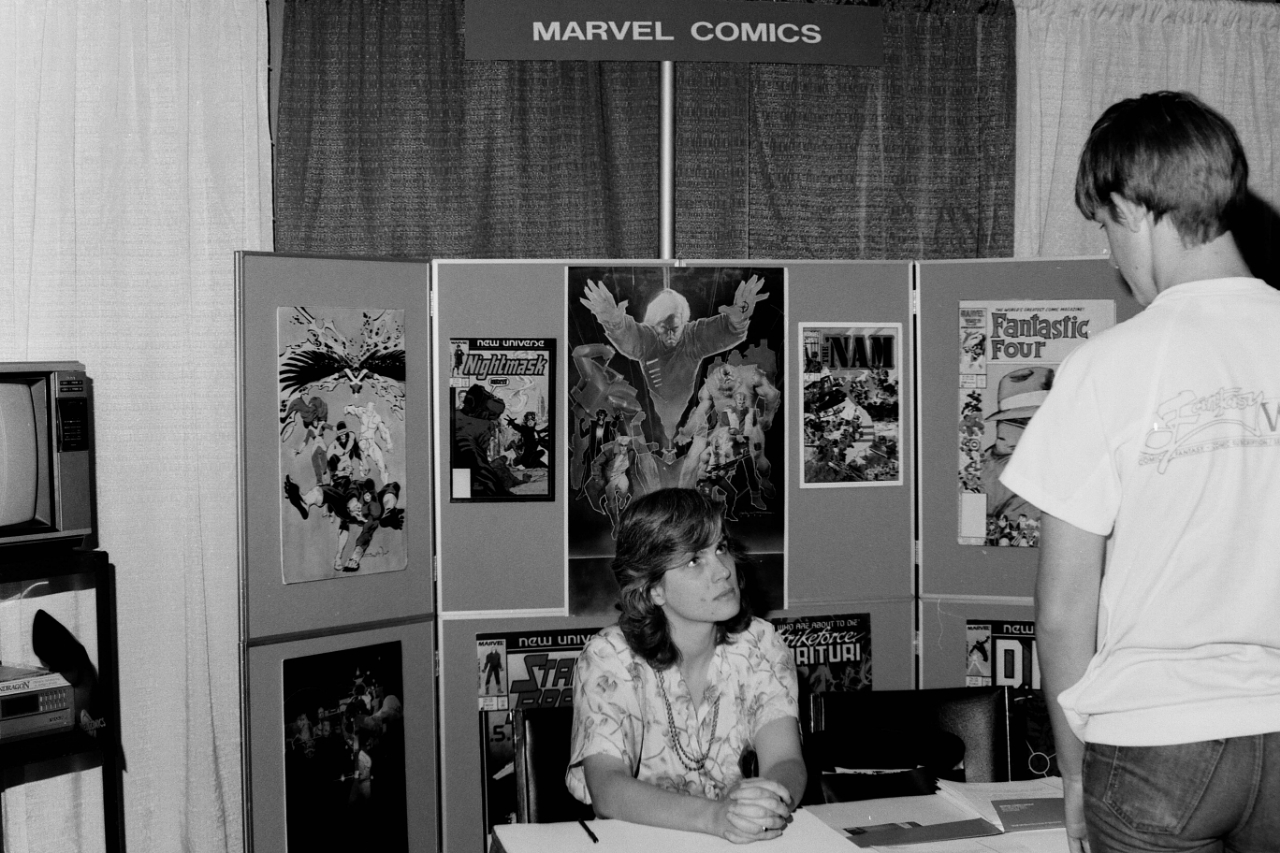
Establishing herself at Marvel Comics
Busiek: "Carol started at Marvel in 1982. Before that, the direct sales manager was Mike Friedrich. Carol started as his assistant, and after a couple of months, Mike left, and Carol was doing the whole thing. So Carol took control of that department pretty early in her career, and the Direct Market was maybe 15% of Marvel's sales at the time she started."
Lou Bank was hired by Kalish to work in Marvel's direct sales department in 1987. Bank: "I lived in Carol's basement at first. I got the job and just said, 'Okay, I'm going to move up on this date, and I guess I'll try and get it together, find a place to live.' And she more or less said, 'Well, why don't you just stay with us? We have an extra room.' She was really, really generous. So everything I owned went into their basement. She'd take me out to lunch. She was generous in the extreme."
Kurt Busiek was hired by Kalish to work in Marvel's direct sales department in 1988. Busiek: "There was plenty of room to grow. When Carol started…you ordered Marvel Comics for the Direct Market off a typed sheet listing title, issue number, and that was it. This sounds really basic today, but…the idea that "Spider-Man fights Dr. Doom in this issue," and maybe retailers would like to know about it…that wasn't happening when Carol walked in the door. Carol had to start that.
"That Marvel would do press releases and tell fanzines about the stuff that was coming up, that wasn't happening. It wasn't until Carol was in place that Marvel was doing a catalog and order form that was anything more than just a list."
Peter David also worked in Marvel's sales department. David: "She was very much involved in going to retailers and teaching then Retailing 101. She also educated them in terms of display. She was very much determined to make the retailers better retailers, and thus expand the market."
Busiek: "Marvel also provided retailers with a copy of a book called Guerrilla Marketing [by author Jay Conrad Levinson], that helped them market their stores with very little money, and that was something that retailers desperately needed. Carol wanted retailers to have those tools, to know things like how to write press releases and get them in the local paper."
Mike Richardson owned two comic stores in Oregon before he founded publisher Dark Horse Comics. Richardson: "Carol is the unsung hero of the direct sales market. I knew Carol way back in the '80s. I had just opened my retail store, and Carol visited my store. Marvel was the unquestioned power to us retailers at the time, and…Carol gave me her card. And you could call Carol. It gave me a bit of power with the customers, because as you know, comic stores aren't just a store to customers, they're a hangout. And people in the store would get to talking and discussing and maybe have a question or get into an argument, and I could say, 'Well, let's call Carol Kalish at Marvel.' And that was a big deal. 'You can call someone at Marvel?' 'Yeah, she's a VP or whatever.' And Carol was accessible. She would give you information."
Hidden problems turned into strengths
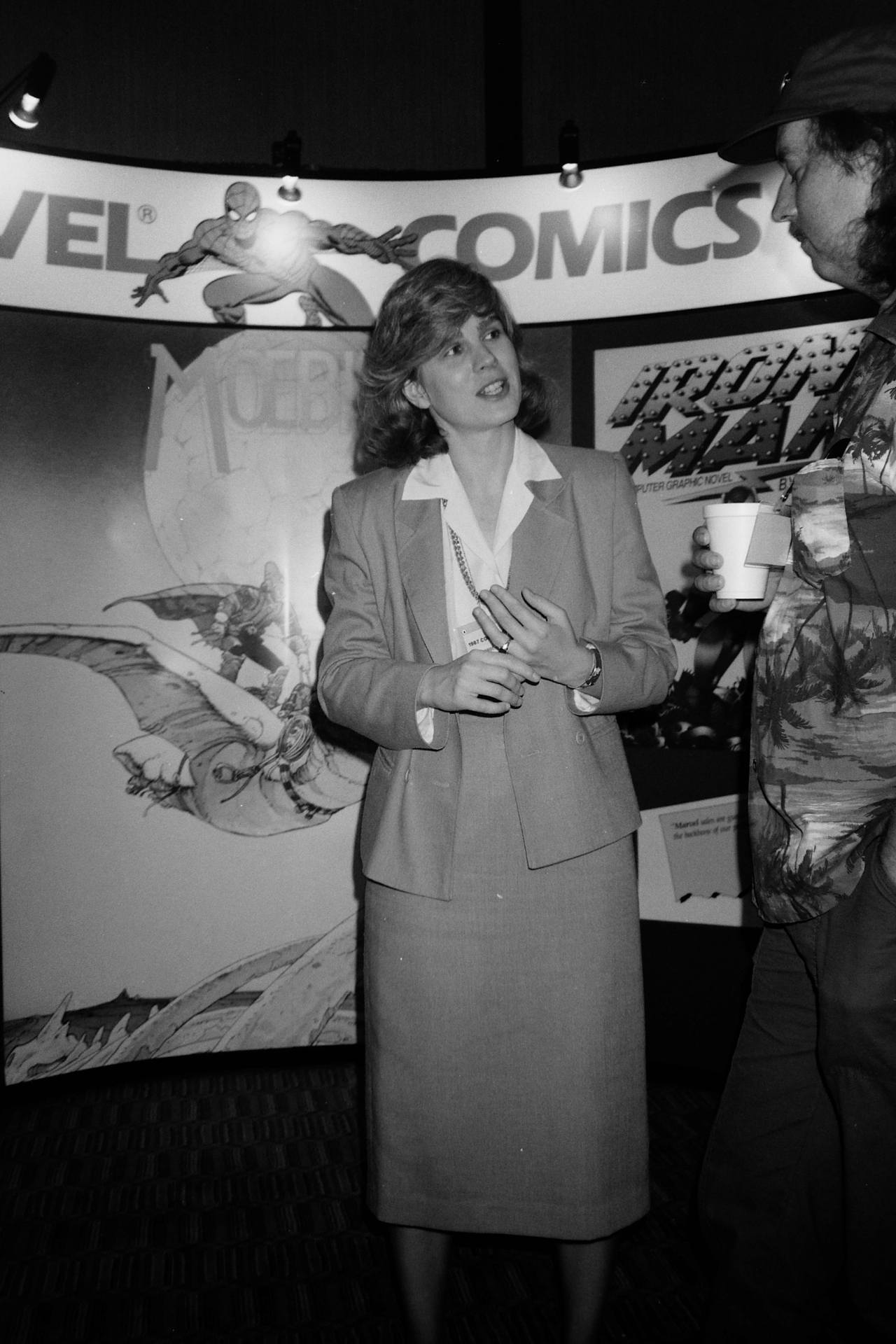
Thompson: "She was a stunning example of how to work past disabilities. I remember sauntering through a mall with Carol and as we chatted, she says something about the challenge of speaking with a stammer. I say, 'Carol, you don't have a stammer.' She sparks back at me, grinning: 'I think I know whether I have a stammer.' I flash back over countless conversations and realize with amazement that wow, yes, she does have a stammer! She'd pause or take a breath right before she spoke. She learned how to control the stammer. It just never registered with me until that minute. She found a way to work around it. It was important for her to communicate. So she did.
"My brother worked for her. And something came out from her, a press release or whatever, and it had a spelling error in it. She had approved it, but she called my brother on the carpet for it. She said, 'You are my assistant, and you know I am dyslexic. It's your job to see that you correct my errors. Do not hesitate to challenge an error I make. If you know I'm wrong on something, point it out immediately so we can fix it.'"
Levitz: "She was legendary for having misplaced or upside-down slides in her show, and she'd take the teasing for that."
Bank: "It seemed like every third presentation, this would happen. She'd always demand that she put together her own slides."
Thompson: "She was a rock, a problem-solver. Imagine being dyslexic, and having a stammer. What do you choose for a career path? Being in charge of a promotions department. What the heck? But that's just how she'd push through, work through, fight through everything. So imagine that. Imagine that."
Innovation and strengthening the market
Richardson: "Seriously. People were making change out of tackle boxes."
Bank: "Without her, there's no cash registers, and that sounds like a small thing, but that makes you a professional organization, and later, the display racks. Without Carol, there's none of that. She developed a program for stores to have plastic bags that were branded with Marvel art on one side, and the logo and address of the store on the other side. And the co-op program. She was the first one in the industry to do co-op advertising."
Busiek: "When I was in the direct sales department, we had a co-op program for store signs and the like. If you were going to put a Marvel character on your store sign, Marvel would pay half the money for making that sign. But we didn't have a program for Yellow Pages ads. DC had a good program there. So if you put DC characters in your Yellow Pages ad, DC would pay for part of your ad. I asked Carol why we weren't more aggressive about Yellow Pages ads, and she said it's very simple: 'If you want to buy comics and you pull out the Yellow Pages, you already want to buy comics. But if you're driving down the street and you see a big sign with Spider-Man on it, you might want to look into it. Nobody looks up comic book stores in the Yellow Pages unless they've already made the decision to buy comics. And you know what? If they see Superman or Batman in that ad, they'll know the store has Spider-Man and the X-Men, too.'"
Richardson: "Every retailer in those days felt a connection to Carol. I'm sure I'm not the only one who called her at home, because you could call her at home. She handed out her number, she gave it freely. She made you feel like you had someone on the inside that you could talk to."
Levitz: "She had great relationships with those guys. One of the biggest challenges I had as I started to build a team was to find people who could compete with her in that area. Sometimes it didn't feel so much, at least in a sales sense, that we were competing with Marvel. We were competing with Carol's relationships with retailers. Carol's footprints were deep enough that I had a problem."
Geppi: "She was a champion of the retailers, but she told them things they didn't always want to hear. in. And while she was a college graduate, she was never condescending to a retailer who maybe wasn't so sophisticated. She never made them feel any less intelligent. She recognized that they were all young entrepreneurs in a fledgling industry that needed all the support they could get. She knew many of them were starting a business on a shoestring. She was there to help. Always smiling, always pleasant. Her voice was effervescent. She made you feel welcome."
Busiek: "Her view of the success of the comic book industry could be boiled down to 'A rising tide lifts all boats. And we have the biggest boat.' People used to say back in the '80s that Carol Kalish was responsible for selling more Fantagraphics books than [Fantagraphics publisher] Gary Groth. Because Carol so thoroughly made it her job to improve the retail operations throughout the industry. Carol had a huge effect on creating a network of stores that knew what they were doing."
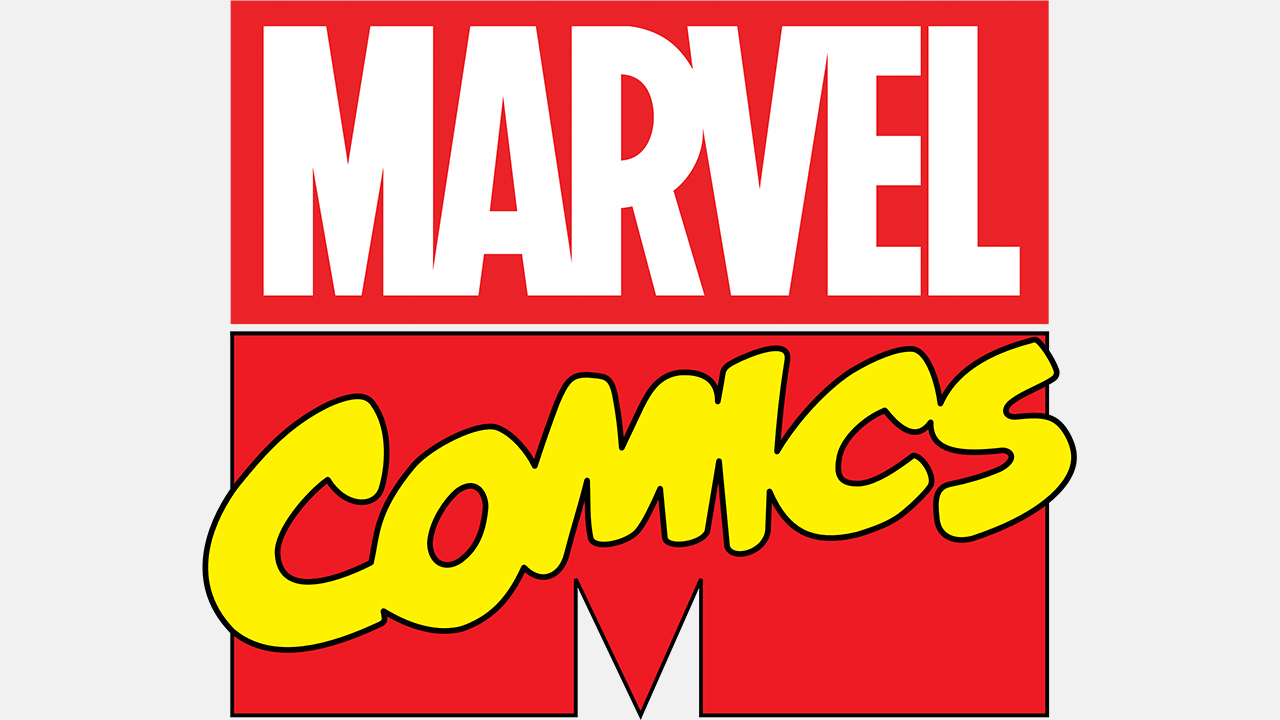
Changes at Marvel
Marvel sales rose throughout Kalish's tenure, and most of the growth was in comic store sales, as newsstand became a smaller piece of the pie.
Geppi: "Remember, the legs under the table of the Direct Market weren't all that sturdy yet, but Carol's voice within Marvel was very influential. I'll never know for sure, I wasn't in those rooms, but my bet is that Carol was even more influential than any of us ever realized when Marvel might have been dismissive of this whole comic store thing."
Howell: "Various wars would break out between editorial and the sales department, on a fairly regular basis."
Busiek: "Editorial and sales did not quite get along. Editorial was convinced that the books were selling because of their superior quality, and a monkey could sell them. Sales was of the opinion that perhaps it took more than a monkey."
Bank: "Carol never had a close connection with the editors."
Geppi: "Barry Kaplan was [Marvel's] CFO, and I like Barry very much. But he was your typical CFO-type, 'Pay your bill, don't want to hear it.' Carol, I would speculate, would assuage Barry a bit, keep things going for a distributor that was just eeking along, keep those accounts going, for the sake of the entire market. I think she saved more asses than anyone will ever realize."
Kalish was eventually moved into a newly created position, vice president-new product development.
Howell: "During her last year, Carol was promoted from being head of direct sales to being head of specialty projects. She thought that gave her some leeway to turn out stuff that was in comic book form that could reach a larger segment of the reading public. She wanted to start a line of religious comics, and made a deal with the largest chain of religious bookstores in the country. She spoke to the people at various historic Civil War sites and said, 'If we turn out a comic book version of the famous battle that took place here, would you sell it in your gift shop and keep reordering it?' Carol also made a deal with — I think — Hallmark to produce greeting cards that were also 8-page comics. Again, it was a great idea that had no in-house support."
Busiek: "Carol spent so much time trying to develop these other lines of comics that would appeal to different markets. And I think in the interim, we have discovered that we appeal to different markets. She was working out a deal with a Spanish-language distribution group in New York, the people actually reaching the Spanish-language newsstands, the telenovela comics and so on. She was the one at Marvel who was excited about it, but nobody else at Marvel was, so the deal never came together. At the time, at the corporate level, they weren't interested in what they saw as a tiny little niche. But…it's a way to grow readership in an entirely different market. I think it could have grown the marketplace."
Bank: "I think Carol was the one who said, 'Let's bring manga in. Let's get Akira.' Obviously it doesn't happen without [translator/importer] Toren Smith, but she was the one who pushed for that to happen at Marvel."
Levitz: "She had just made the shift over to a creative job, and would build what she hoped would be new lines for Marvel. The 'might have been' is tantalizing to think about. There probably weren't more than five or six of us who had worked at the major publishers in those years in business or leadership roles who really had an effect on changing the industry. Carol was certainly on that short list of people. And she got cut short. It would have been interesting to see what she would have come up with.
Richardson: "Carol's goal, I believe was to be the president of Marvel. I believe she was in line to get that job, or at least she thought she was, and when she did not get it, that was a big blow to her. It's my memory that she thought she had earned the shot, but she did not get it."
Lou: "When I started in 1987, the Direct Market was 25% of Marvel's comic sales; the newsstand 75%. When I left in 1992, those numbers were exactly reversed."
September 5, 1991
Carol Kalish died while walking to the Marvel offices. She had a pulmonary embolism — a fluid clot broke off within her body and seized up her heart, resulting in cardiac arrest.
Howell: "I tend to work all night. I went to bed very late, and got up very late. I got a call from Carol's secretary, Paul Curtis. He said, 'Is there anything wrong? Carol's not here.' I had no idea. Then I got a call from St. Clare's Hospital on 52nd Street asking if I was the partner of Carol Kalish. I said yes, and asked them what this was about. They basically said that I'd better get in there very fast. I did not think that the worst was going to happen. I set the VCR to record Santa Barbara, because Carol and I watched it every evening when she came home. And by the time I got in there, she had already passed away."
Bank: "I remember the moment I heard it. My secretary, Cora, called me. I was coming back from the UK and on my way to Los Angeles. I had one of those early cell phones, and she called me. I can remember Cora called me, and she was really blunt about stuff. So she just said it. I was dumbfounded, and I remember breaking into tears at JFK airport. In that moment, it was an earthquake. All you know is the ground is moving under your feet."
Geppi: "I was at my hotel, the Langham Hilton, in London, when I got the call from Lou Bank. He called me. I am not surprised that he would break down and cry. I was equally shocked. I was in disbelief. She was so young."
Busiek: "The reason this was a big deal in the industry was that Carol had been so important to the comic direct sales market. She was important to the Marvel side of it but really to all of it. [Sales head] Bob Wayne at DC was in competition with Marvel. But he wasn't in competition with Carol. Because Carol was doing things to let Bob do his job better. Bob, to his credit, was trying to do the same. But to the people at DC, Eclipse, whatever, Carol was a voice of wisdom, experimentation, analysis. Pretty much every facet of the comics industry knew Carol as somebody who was a dynamo of energy, making their lives better. She was specifically a Marvel employee, but like I said, her vision of her job was 'make the pool bigger, make everything float better, and we'll get the best out of it.'"
Geppi: "It was kind of a panic. We hated to lose Carol, personally. And business-wise it was, 'Oh, shit. Now what? Our biggest advocate is gone. What does this mean? How are we going to survive?' I don't think anyone thought of the Direct Market as being as solid as we think of it today. To a publisher like Marvel, they may still have been thinking of it as an experiment. They didn't want to divorce the newsstand, because they didn't fully know the Direct Market had the potential to become what it did eventually come to be."
David: "We were stunned. She just collapsed in the street, they rushed her to the hospital, she woke up long enough to say to the effect of 'I don't feel so well' and give them some information, and then she died. All I can say is if there is a God, He and I are going to be having some words when I pass with what happened with Carol. It was completely unexpected and utterly devastating. Carol was about as strong a person as you could possibly imagine. She was in perfectly good shape. It was a reminder of just how fragile life is."
Howell: "I'm not sure that I was feeling much of anything after that. I was just hoping, 'Okay, I'm going to wake up now.'"
Busiek: "Mostly, my thoughts at the time were, 'My friend is dead. And my other friend is unmoored.' This was a personal loss for me, and much more so for Richard."
Levitz: "For her memorial [Marvel president] Terry Stewart really wanted it to be at some place that had significance to Carol. He wasn't able to get his first or second choices, so he booked what used to be the Commodore Hotel, and had become the Grand Hyatt in New York. The memorial ended up being in what had been the dealers' room for several years of the Seuling [Comic] Con. When I walked in, I knew Terry had been looking for an appropriate place…and he had no idea what he had coincidentally stumbled into. I told him what this place was and why it mattered. The universe had organized to pay its own respects and thank-you to Carol."
Impact
Howell: "I think Marvel editorial did their best to bury Carol's memory as fast as they could. There were always feuds between sales and editorial, and sometimes they got very nasty. It still irks me. Marvel sales went up drastically during Carol's period. Editorial wanted to claim it was because their product was so much better. Carol said, 'Well, maybe it's because we have retailers who now know 60% of their sales come from Marvel products, and they're running a better business, too.' They had a big difference of outlook there."
Busiek: "Carol was one of the smartest people at Marvel, and beyond Marvel. It's not an insignificant thing to note that Marvel's stupidity about self-distribution [Marvel bought Heroes World in 1995] did not happen on Carol's watch. It happened not all that long after Carol was gone, and it had been something that Carol had been stopping them from doing for years. Carol was very, very smart in terms of improving things for Marvel and the industry as a whole, but Carol was also very, very smart in stopping them from doing stupid shit. It's hard to see the things that didn't happen because Carol was smart, so the industry tends to focus on the things that did happen."
Bank: "What makes her important today is the lessons the industry didn't learn. Her approach to building the market…I never got the sense that there was anyone before her, or maybe after, who had the vision that she had toward building a larger, broader market. No, certain, there's been nobody since who's had that vision. Carol brought a vision of making this specialist market into a professional market. She was the original disruptor. She was able to look back and see how other people developed other markets, and applied those lessons in a person-to-person way."
Thompson: "Had she lived, we would have an alternate universe for this industry. What would that look like? I'm not sure. We have to live in this one. But that's just how fast she was, how full of ideas she was. She was inventive. Carol was jaw-droppingly fantastic. One of the most brilliant people I've ever met."
Geppi: "She was a voice of reason. She was a stabilizing factor. We owe a lot to her. I would like for the new people in the industry to understand that there's always been a need for somebody to step up in the industry and keep things together. It's a shame there's not a Carol Kalish award somewhere to give retailers or somebody so that she can be more remembered. It would be very nice as an honor, for the people who knew her to see it, and also for the new people to understand the blessing and privilege it was to know her. Maybe someday, somebody will think of an award they want to do and they'll call it 'The Carol Kalish Award, Champion of the Direct Market.'"
Howell: "Every piece of art that I produce, even now, has some dedication to Carol — emotionally, professionally, or in some other way. I doubt that Carol would be impressed by any assertion of mine that I thought she was strikingly beautiful. But each of the female characters I draw — the Scarlet Witch, Wonder Woman, Hawkwoman, or especially Portia Prinz of the Glamazons are each strongly influenced by her grace and intelligence."
Thompson: "Knowing her, I think I kind of get what saints were like. She would light up a room. She was what 'alive' was. I would like everyone to know Carol. Because everyone should be like Carol."
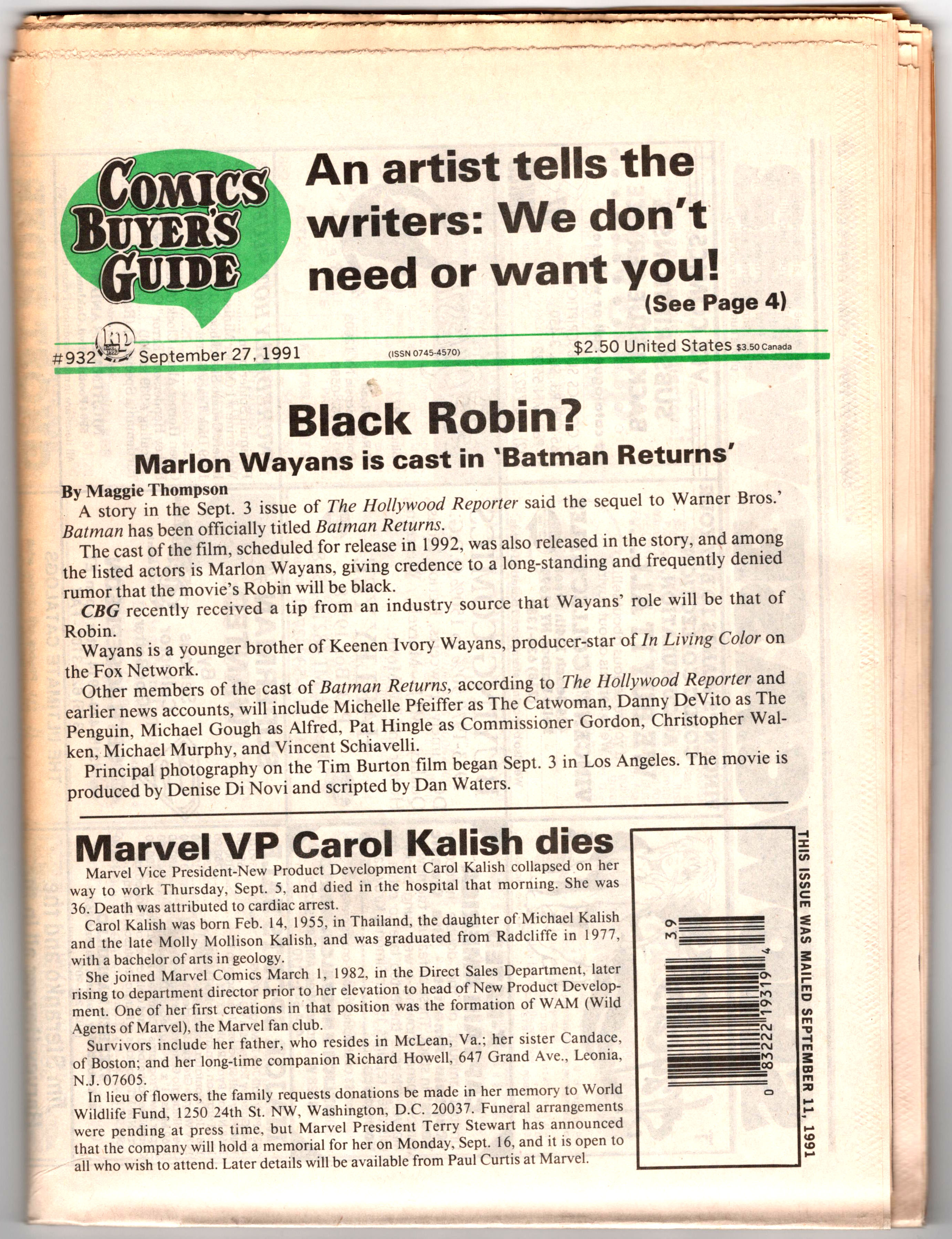
Tributes to Carol Kalish from Comics Buyer's Guide #932
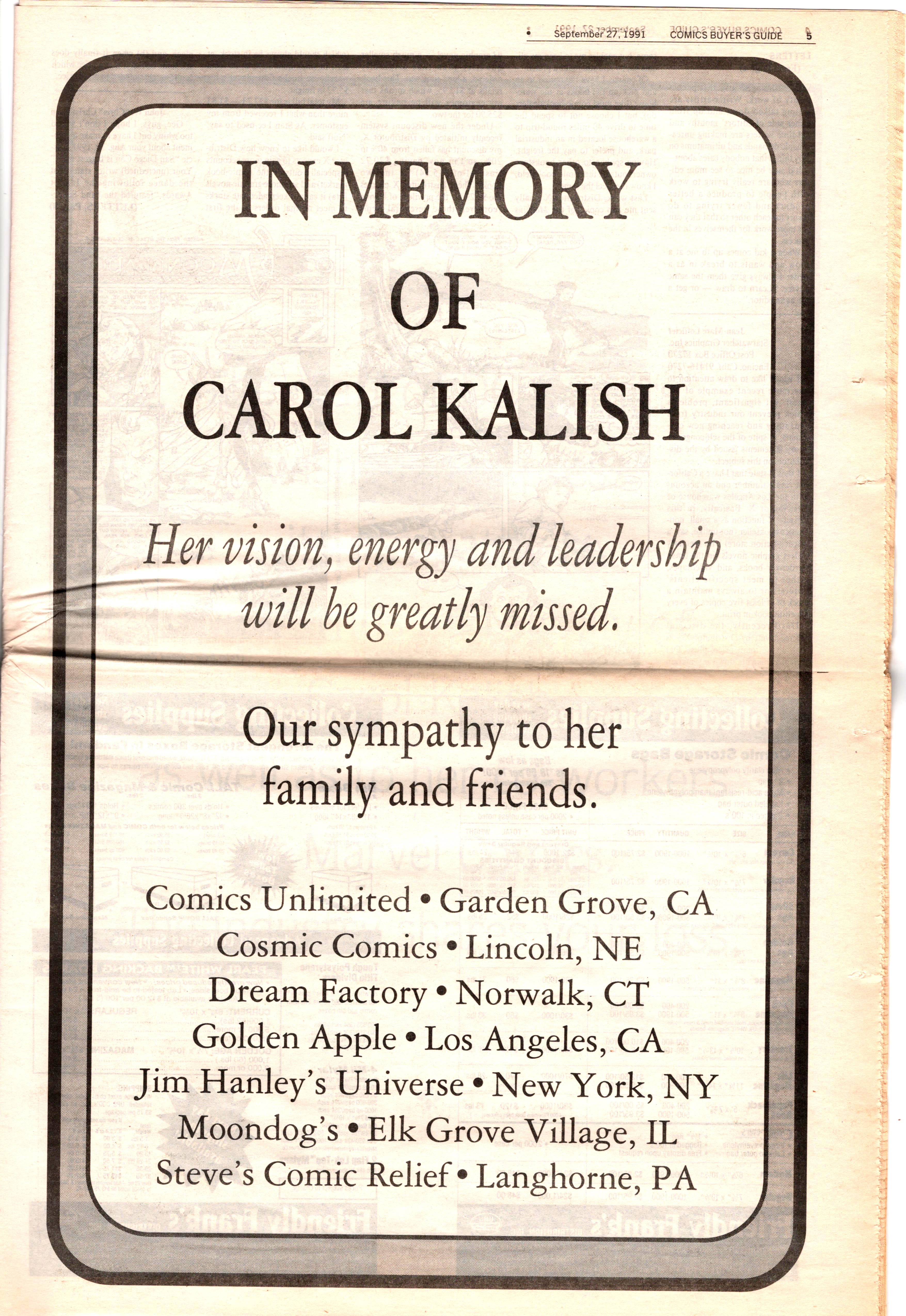
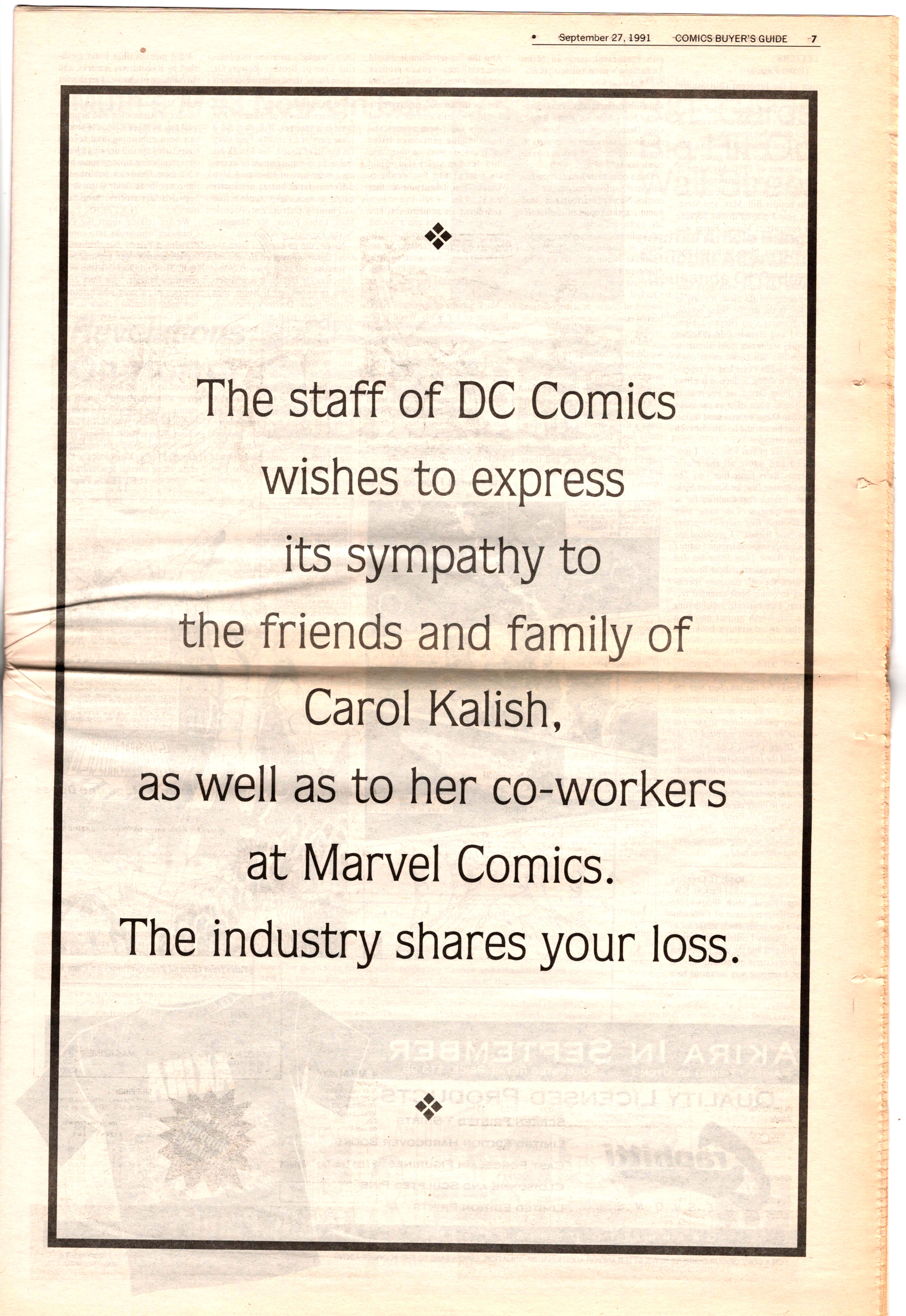
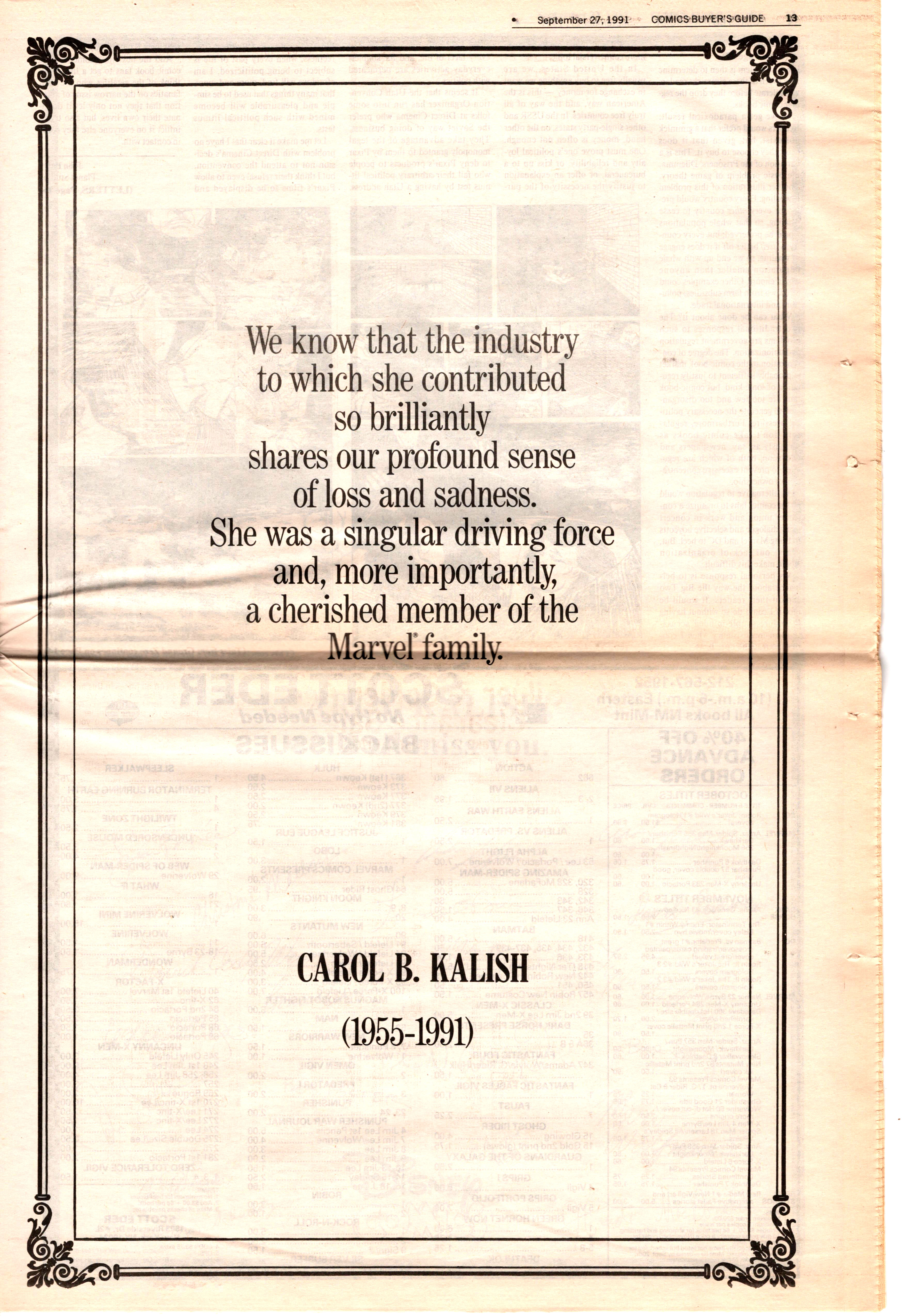
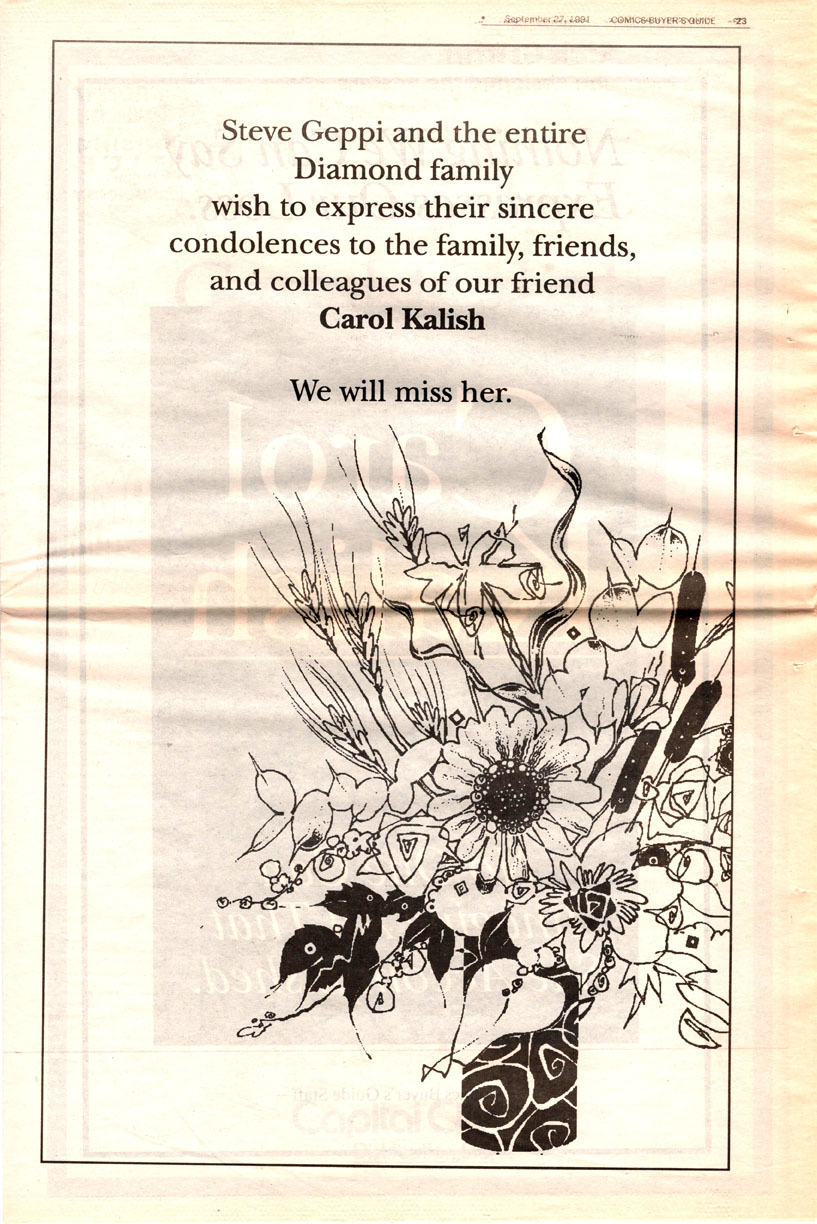
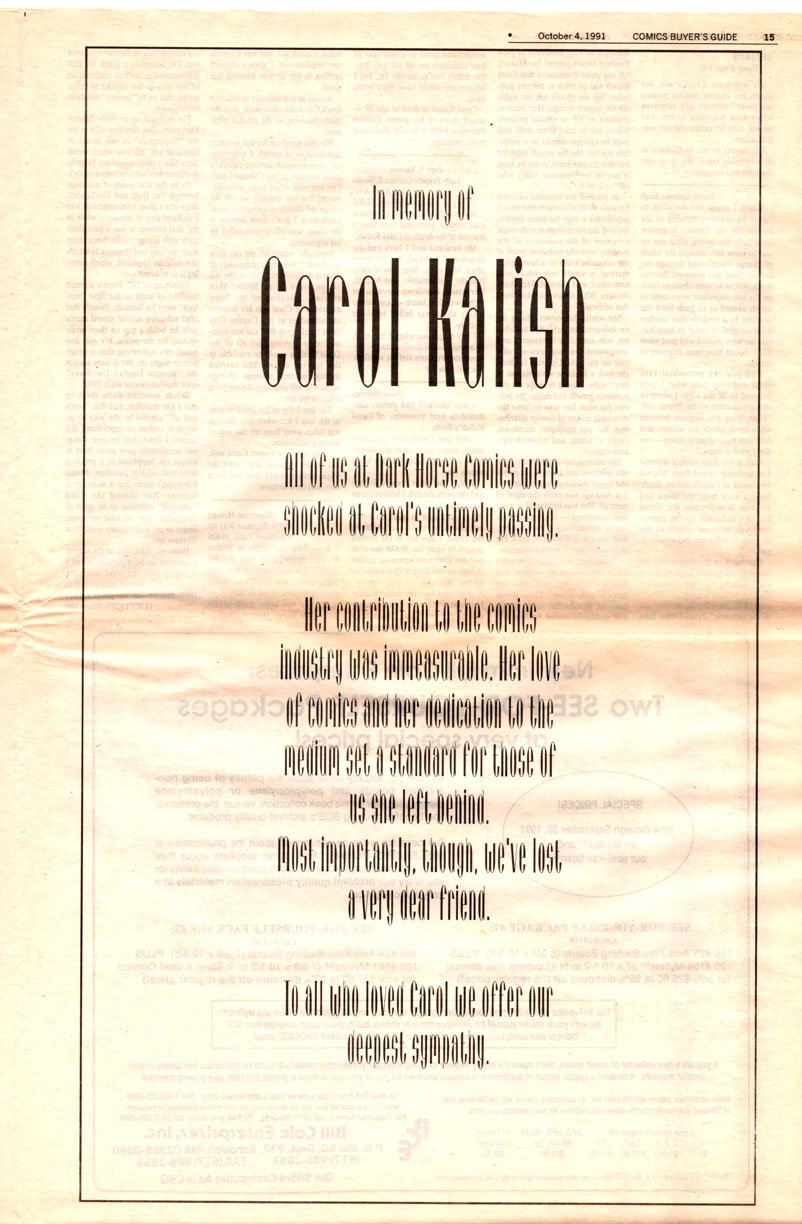
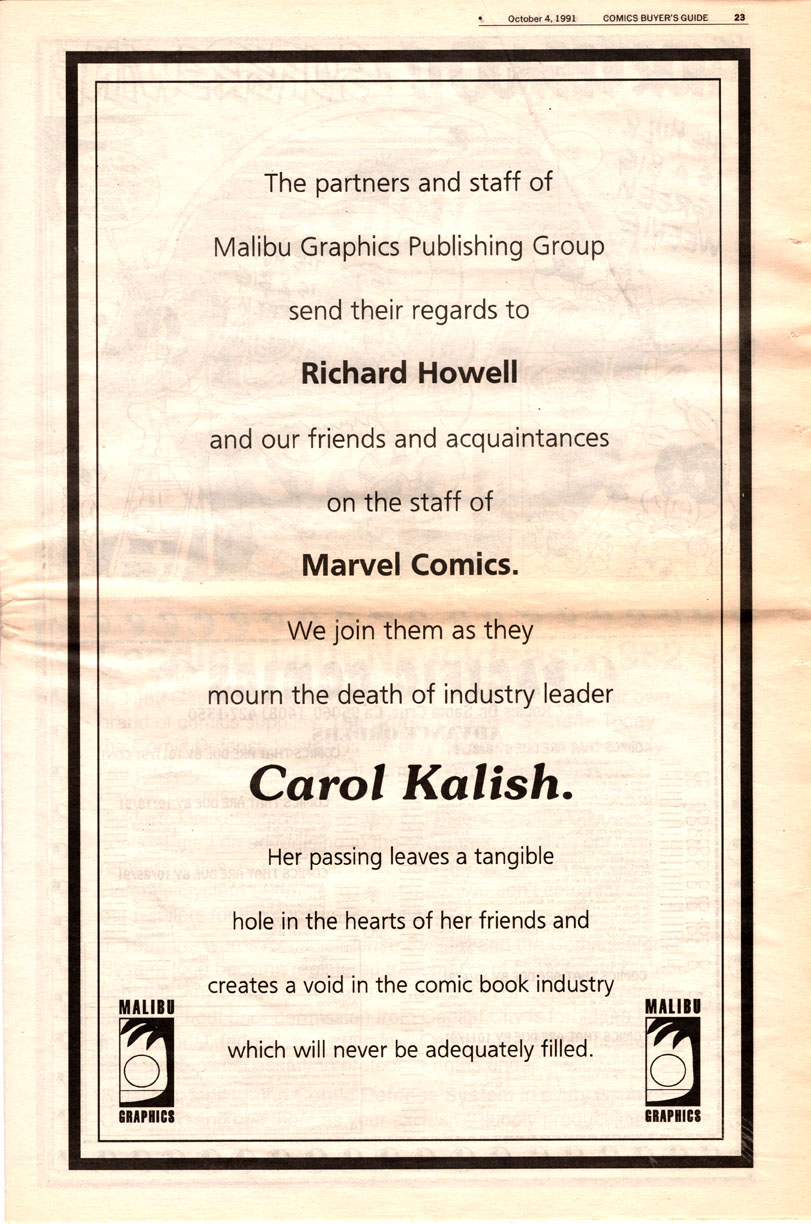
—Similar articles of this ilk are archived on a crummy-looking blog. You can also follow @McLauchlin on Twitter


